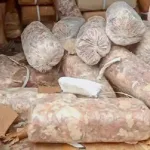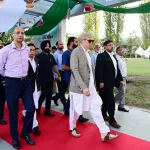With an intent to to make a contribution towards his motherland, Kashmir, in 2017, Zargar Zahoor landed back in kashmir valley after deciding to impart art education to the aspiring artists in valley.
Zargar Zahoor, the former Dean of Fine Arts JMI started his own art classes at his studio in Zakura in Srinagar. According to zargar, he owes his journey of becoming a world famous artist to his homeland kashmir.
Having an experience of over 40 years, he now imparts art education in Kashmir for almost free. “For longest time in my life, I served in Delhi. Now is the time to benefit my people,” says Mr. Zargar.
Born in Khawaja Bazar, Srinagar, Zargar now 70, is a master in landscape painting. According to him, it was in kindergarten that his liking toward art was born. “I would keep drawing whatever caught my eye, it was my favorite activity,” he remembers. His interest in art rose as he went to middle and high school. Zargar was often lauded by his teachers as they discovered magic in his hands. Recalling a precious memory of 9th grade when he studied at Hari Singh High School, Zargar’s teacher on observing his work keenly one day said to him, “Dear, never
give up on Art. Your skills will take you to great places.”
give up on Art. Your skills will take you to great places.”
In 1971 Zargar joined MS University of Baroda to graduate. Later, with his mother’s support he became the first in Kashmir to have done a Masters degree in Visualization. In 1985, Zargar joined the faculty of Fine Arts at Jamia Millia Islamia. He kept painting his canvas with shades of sunrise and sunset and developed a style unique to him. During his 30 year tenure at JMI, he seized a chance to work with some renowned artists in the history of India. “As I look back, I feel blessed to have worked with A.R Nair, Paramjit Singh and Jatin Das.” In 2014, Zargar retired from JMI. However, he didn’t put down the brush he took when he was 15. For the rest of his life, Zargar plans to stay in the valley and dedicate to the art in Kashmir. “I intend to cultivate in Kashmiri folks the meaning and purpose of art,” he declares, “while also enlightening them with economic avenues that art can bring,” he adds.
In 2021, Zargar started conducting in-person classes at his art studio to teach the basic language of art and polish the potential skills of aspirants. Be it landscape, portrait or any other type, Mr. Zargar informs, “I train students of all age groups and backgrounds with whatever technique they wish to learn.” To engage more students, he now conducts daily online classes too. According to him, Kashmir’s nature has a lot in store for an artist. To give students an immersive experience, on weekends Zargar conducts classes outdoors that too free of cost.
When asked how the classes are going so far, he remarks that, “The response has been great. Art is a creative therapy for everyone. It makes me happy when doctors and engineers come to learn from me.” Over the years Mr. Zargar has participated in more than 50 exhibitions. For the first time, he showcased work at France embassy in Delhi where he was widely appreciated. “That felt like a milestone, it was quite encouraging,” he exclaims. At an Exhibition in Delhi, Zargar’s work was also bought by The World Bank. In 2014, he was invited by the King of Saudi for judging an art exhibition and suggesting the needful. Parliament House and Lalit Kala Akademi Delhi are among the few to hang Mr. Zargar’s work on their walls.
In an exclusive interview, Zargar told Rising Kashmir that his future plans include exhibiting his students’ works at national
level. “I want them to interact with customers, artists so they gain exposure to the art industry.” While expressing deep sorrow over the increasing mental health crisis in Kashmir, Zargar asserts the need to use art as a tool to fight mental health issues. Calling art as a food to the soul, he concludes “More people in Kashmir must try art. It can be helpful to channelize their anxiety and intrusive thoughts.”
level. “I want them to interact with customers, artists so they gain exposure to the art industry.” While expressing deep sorrow over the increasing mental health crisis in Kashmir, Zargar asserts the need to use art as a tool to fight mental health issues. Calling art as a food to the soul, he concludes “More people in Kashmir must try art. It can be helpful to channelize their anxiety and intrusive thoughts.”





